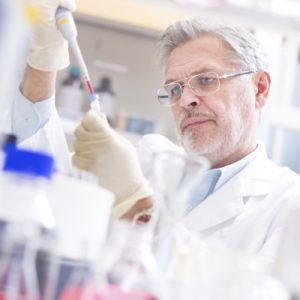
Zinc and Testosterone: Understanding the Connection
Testosterone is an essential hormone for men and women, and zinc is a critical nutrient. What they have in common might surprise you. The relationship between zinc and testosterone could leave you with a deficiency in both that can lead to many unwanted health issues.
What is the relationship between zinc and testosterone production?
Zinc helps testosterone production in numerous ways, including inhibiting how the enzyme aromatase reduces free testosterone levels by converting them into estradiol – the body’s leading form of estrogen. Men and women who gain abdominal weight during middle age often do so because testosterone levels are being depleted by aromatase, which, in turn, increases estrogen levels. Estrogen is responsible for signaling the body to hold on to and store fat.
Zinc helps support the metabolism of carbohydrates, fat, and protein; processes also assisted by testosterone. Taking zinc and magnesium supplements together can help improve testosterone production as magnesium helps the body absorb zinc better.
The prostate also has higher concentrations of zinc. As a man ages, and his testosterone levels decline, his prostate begins to increase in size. Zinc is considered a marker for prostate function and has shown benefits for treating infertile males with chronic prostatitis.
For women, zinc is crucial for many reasons. Testosterone helps to prevent muscle and bone loss that can lead to fractures as a female gets older. A woman’s sexual desire is also regulated by testosterone. Women who are zinc deficient may suffer from PMS and menstrual cramps. Since zinc helps prevent estrogen conversion of testosterone, it maintains testosterone levels and decreases the retention of fat that can lead to estrogen dominance that often occurs during menopause. Finally, zinc is crucial for a woman’s pregnancy to support the natural health and development of the fetus.
A deficiency in zinc and testosterone can lead to many unwanted health issues.
Why Does Zinc Deficiency Impact Testosterone?
The body cannot store zinc, meaning it needs a fresh supply every day. One of the problems we see with a deficiency in zinc and low testosterone is that zinc supports testosterone production. Zinc also helps to improve spermatogenesis – the process of sperm cell maturation. Men who are zinc deficient may suffer from infertility.
Zinc exists at elevated levels in the male testes, especially in germ cells. A deficiency of zinc can result in sperm cell abnormalities.
Because testosterone is part of a hormonal process that includes and influences the hypothalamus-pituitary-gonadal axis, it is essential to maintain balance at all points of the axis. Thyroid hormones rely on hormones produced by the hypothalamus and pituitary gland for their secretion and regulation. Anything that interferes with proper hormone production can have widespread reactions. Zinc helps maintain proper function of the thyroid by supporting the release of hormones that trigger thyroid hormone production.
Another connection between zinc and testosterone is the fact that zinc helps support 5-alpha reductase, the enzyme that transforms testosterone into its biologically active form, also known as dihydrotestosterone (DHT).
Zinc deficiency has been linked to primary testicular failure, reducing the function of the receptors for luteinizing hormone in the testes. Lack of zinc can also lead to oxidative stress that damages the Leydig cells that produce testosterone.
Zinc plays a critical role in testosterone production in the Leydig cells, as well as sperm cell maturation.
Studies on Zinc and Testosterone
There have been many zinc and testosterone studies that have shown a connection between this essential nutrient and one of the most valuable hormones in the body. Including magnesium with zinc is beneficial because magnesium is a cofactor in more than 300 biological processes and enzymatic reactions in the body. Testosterone is a production of enzyme, amino acid, and protein actions on cholesterol and its subsequent hormonal conversions. Research has shown that a combination of zinc and magnesium can improve testosterone levels, and may help older adults resist the frailty, mobility impairment, and other physiological changes that come with the aging process.
In a zinc and testosterone study out of South Korea, 88 men between the ages of 40 and 60 were tested for the micronutrients copper and zinc to see how they influence testosterone synthesis. Serum testosterone levels and hair tissue micronutrient concentrations showed that men with normal testosterone levels had higher zinc concentrations as compared to men with low testosterone. For men with low testosterone levels, researchers found higher copper concentrations and an elevated copper to zinc ratio in hair tissue.
One zinc and testosterone study looked at the impact of taking oral zinc for 100 men on hemodialysis who were in end-stage renal disease. Before starting treatment with oral zinc, blood measurements were taken of luteinizing hormone (LH), follicle-stimulating hormone (FSH), testosterone, prolactin, and zinc. Following six weeks of 250 mg/day of zinc sulfate, the serum plasma levels were once again checked. Although prolactin and FSH levels did not change, LH, zinc, and testosterone levels increased significantly.
Many studies have shown how beneficial and important zinc is to testosterone.
What Are the Symptoms of Zinc Deficiency?
Because zinc is such a crucial nutrient for the body, its decline can cause a significant amount of damage. A lack of zinc influences the brain, central nervous system, gastrointestinal tract, skin, reproductive, skeletal, and immune systems. One reason we see a lowering of zinc and free testosterone levels in adults is that much of the food produced in the country today comes from nutrient-depleted soil. Pesticides, chemicals, and other poor farming habits decrease the amount of essential nutrients in our food supply.
Symptoms of zinc deficiency are divided into categories in the chart below:
| Zinc Deficiency Symptoms | |
|---|---|
| Skin | Acne Eczema Seborrheic dermatitis Xerosis (dry, scaling skin) Impaired wound healing Open sores |
| Hair | Alopecia (thinning) |
| Immune | Impaired immune functions Increased risk of illness Reduced inflammatory cytokine levels Chronic inflammation |
| Gastrointestinal | Reduced appetite Diarrhea |
| Senses | Altered sense of taste and smell Night blindness |
| Oral | White coating on tongue Oral ulcerations |
| Cognitive | Impaired learning Lack of alertness Depression Irritability Behavioral abnormalities ADHD Schizophrenia |
| Hormonal | Low testosterone Male infertility |
There are many reasons why a person could have low zinc and testosterone levels. Aside from poor dietary zinc intake, chronic diseases such as sickle cell, kidney, liver, and Wilson’s diseases can lead to zinc deficiency. Mercury exposure and bariatric surgery may also play a role in low zinc levels. Diseases or surgeries of the small bowel may hinder zinc absorption.
Zinc deficiency can also impact women differently than men. Polycystic ovarian syndrome (PCOS), a condition often associated with high testosterone, may benefit from zinc supplementation. In one study, women with PCOS who received zinc sulfate saw the following benefits:
- Decreased alopecia (hair loss)
- Reduced high-sensitivity C-reactive protein
- Lowered plasma malondialdehyde (MDA) levels
- Decreased hirsutism
Symptoms of zinc deficiency can impact many areas of the body.
What Happens If You Have Too Much Zinc?
Whether you have too little or too much zinc, neither situation is healthy for the body. If you are concerned about your levels of testosterone, and zinc excess is a possible issue, these are the signs you may notice:
- Nausea
- Vomiting
- Abdominal pain and cramps
- Headaches
- Diarrhea
- Loss of appetite
Balance is crucial in life, whether we are discussing hormone levels or the vital nutrients the body needs. The current recommended daily allowance (RDA) for zinc in adults is:
- Women – 8 mg
- Men 11 mg
Some people, especially men who can benefit from taking more zinc to help boost testosterone production, may take up to 40 mg per day. However, anything more than that can lead to side effects. Also, you should also speak with a hormone specialist before addressing zinc and testosterone deficiencies.
Too much zinc can lead to unwanted side effects – always speak with a hormone specialist before taking zinc to boost testosterone production.
How to Balance Zinc and Testosterone Levels
One of the best ways to increase zinc and testosterone levels is through dietary intake of foods rich in zinc concentrations. It is recommended to strive for 11 milligrams of dietary zinc per day. However, if you have gastrointestinal issues such as Crohn’s disease or other disorders that can inhibit zinc absorption, you may need supplementation. The foods that contain the highest amount of zinc are:
- Oysters
- Red beef (preferably grassfed, organic)
- Crab
- Cashews
- Lobster
- Pork loin
- Beans
- Almonds
- Dark meat chicken
- Low-fat organic yogurt from grassfed cows
- Eggs
- Fortified breakfast cereals
The next way to increase zinc and testosterone levels is with zinc supplementation. According to research, daily zinc supplementation may double testosterone within a few months. The recommended beginning dosage of zinc each day is 5 to 10 mg, working one’s way up to no more than 25 to 40 mg per day. It is crucial to discuss zinc supplementation with a doctor who specializes in hormone replacement. There are four types of elemental zinc, all with benefits, although their zinc percentage by weight differs. You would need different amounts depending on the type of zinc selected. The dosages below equal 50 mg of elemental zinc:
- Zinc citrate – 146 mg
- Zinc gluconate – 385 mg
- Zinc monomethionine – 238 mg
- Zinc sulfate – 220 mg
For questions about zinc and testosterone, please contact RX Hormone medical clinic for a confidential phone consultation at no charge.
